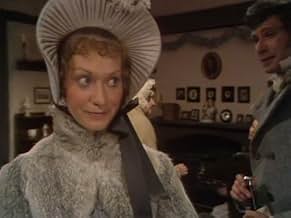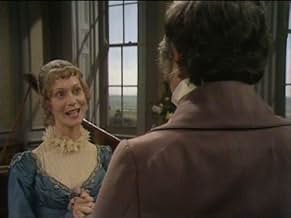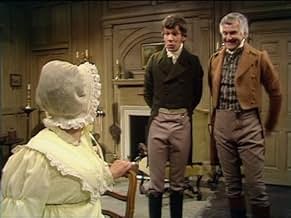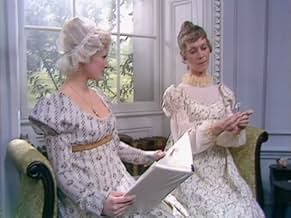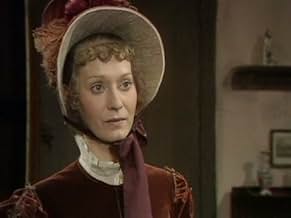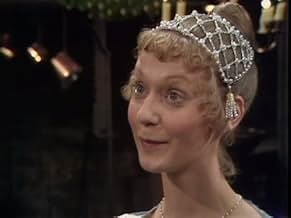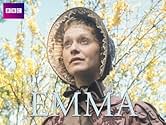Ajouter une intrigue dans votre langueWhile matchmaking for friends and neighbours, a young 19th Century Englishwoman nearly misses her own chance at love.While matchmaking for friends and neighbours, a young 19th Century Englishwoman nearly misses her own chance at love.While matchmaking for friends and neighbours, a young 19th Century Englishwoman nearly misses her own chance at love.
Parcourir les épisodes
Avis à la une
The appealing nature of this adaptation is its length and its fun. Characterisaton comes close to the work Davies did in 1996 for A&E, although it differs somewhat. That might be down to the literary criticism of the day, though, and particularly in the judgment upon Harriet as a dull, stupid cow. Davies was a little more nuanced in his judgment upon all characters, but nonetheless, the work Denis Constanduros produced was very true to the spirit of the novel and made use of the comedy elements in the original text. Particularly in costume and the one character of Mr Woodhouse Constanduros produced classic comedy that was about words rather than one-liners and ridiculous situations.
Also the age-difference between Emma and her Mr Knightley is very much apparent. Knightley is not as vigorous as Mark Strong in the role, but this Mr Knightley has not the task of radiating sex-appeal, but rather radiating stability and wisdom through experience, like Austen's version.
Despite the lack of technology to make shots and filming on location truly possible, they did well. There is also no music which made it necessary for the actors and director to truly act and film the characters' feelings so the viewer could comprehend them. It is surprising how they managed to still convey the same emotional tension (or even more of it than they do now) through mainly just close-ups. That, though, might slightly bother the modern viewer. However, through it, viewers are compelled to use their own brain more than with modern adaptations of the novel.
Most of the contents is not toned down, only maybe the complicated business with Churchill and Jane when things are going wrong in the end. The main point of Emma and Knightley's blindness to each other stays upward better than in the Miramax version of 1996. And that without all that Miramx had to their disposal.
It is the only adaptation of the work as well, that uses the wordiness of Austen. It is important as a viewer that one listens more than that one watches. We could easily just make the adaptation in a hear-play, it would make little difference. The language is so expressive and the comedy is so much embedded in it that the physical acting matters less. And that is what Austen is about: it is no slapstick, but pure wordy wit. We have come a long way since the 1970s in comedy.
All in all, a satisfactory adaptation without sex-appeal, but with sweetness. I daresay, how Austen would have liked it.
Also the age-difference between Emma and her Mr Knightley is very much apparent. Knightley is not as vigorous as Mark Strong in the role, but this Mr Knightley has not the task of radiating sex-appeal, but rather radiating stability and wisdom through experience, like Austen's version.
Despite the lack of technology to make shots and filming on location truly possible, they did well. There is also no music which made it necessary for the actors and director to truly act and film the characters' feelings so the viewer could comprehend them. It is surprising how they managed to still convey the same emotional tension (or even more of it than they do now) through mainly just close-ups. That, though, might slightly bother the modern viewer. However, through it, viewers are compelled to use their own brain more than with modern adaptations of the novel.
Most of the contents is not toned down, only maybe the complicated business with Churchill and Jane when things are going wrong in the end. The main point of Emma and Knightley's blindness to each other stays upward better than in the Miramax version of 1996. And that without all that Miramx had to their disposal.
It is the only adaptation of the work as well, that uses the wordiness of Austen. It is important as a viewer that one listens more than that one watches. We could easily just make the adaptation in a hear-play, it would make little difference. The language is so expressive and the comedy is so much embedded in it that the physical acting matters less. And that is what Austen is about: it is no slapstick, but pure wordy wit. We have come a long way since the 1970s in comedy.
All in all, a satisfactory adaptation without sex-appeal, but with sweetness. I daresay, how Austen would have liked it.
I really enjoyed this version of "Emma" and my pleasure was largely due to the very convincing performance by Doran Goodwin in the central role. She was so much better than Kate Beckinsdale in the ITV version who it seems to me lacked the necessary vivacity and personality to carry the role. This Emma was very expressive, arch and satirical, very much, I Imagine, as Jane Austen must have been herself. And unlike the ITV version, which was abominably miscast (excepting Mark Strong's Mr Knightley), this casting was near perfect.
My only complaint is that too much of the action took place indoors, which made it a little claustrophobic and too much like a stage play. We were not allowed to see the village or any exterior shots of Miss Bates dwelling, just room doors opening and closing. The only time we saw anyone in a carriage was during the trip to Box Hill and that was all too brief.
But the indoor scenes were magnificent and authentic looking, too good I'm sure to be just studio sets; they must all have been filmed on location, perhaps in the very large house pictured in the opening shots.
My only complaint is that too much of the action took place indoors, which made it a little claustrophobic and too much like a stage play. We were not allowed to see the village or any exterior shots of Miss Bates dwelling, just room doors opening and closing. The only time we saw anyone in a carriage was during the trip to Box Hill and that was all too brief.
But the indoor scenes were magnificent and authentic looking, too good I'm sure to be just studio sets; they must all have been filmed on location, perhaps in the very large house pictured in the opening shots.
10johnbol
If you are a Jane Austen fan and considering to buy a film of Emma i would recommend this version. This because , as a TV series it's longer then any movie and therefor includes more of the original story. Also the acting is very good and the whole production has a Austen feel about it. Yes it's been mostly filmed in a studio but to me that gives it a more intimate feeling. Also i have to say that i did like the version with Kate Beckinsale but do not really care of the version with Gwyneth Paltrow. This TV series lasts about 4 and a half hours. So, if you look for a shorter version , take the Beckinsale and if you really want to dive into it, take this one. I would like to single out Donald Eccles who , as Emma's father, is very funny as is Mary Holder as Mrs. Bates.
If you liked the book Emma by Jane Austen I do not think you will be disappointed with this dramatization. They did change a few things from the book but those who have not read the book will get most of the content. I particularly enjoyed the costumes. The gowns, hats and caps of the ladies were spectacular. The detail, even down to the ornate hat pins, helped make this a delight to watch. The characterizations were quite faithful for the most part. Mr.Woodhouse, while perhaps not quite the same as the book, was an interesting and quite funny character. This mini-series did a very good job of capturing a great deal of the humor of Jane Austen (she is incredibly funny!) which is not all that easy to translate from her elegant prose to the camera and dialog of video rendition. When I see something like this that is so well done it makes me appreciate anew this art form and especially that of script writing....not to mention blocking....editing.... I think the mini-series is friendlier to a good adaption of Jane Austen's novels rather than the movie. This is my favorite of those I have seen with the A & E 1996 version as a close 2nd and the 1996 movie as my least favorite. I have not seen 1948 & 1960 BBC versions - wonder where I can find them???
This old BBC serial from the 70s is a slow ramble through one of Jane Austen's great novels. Like all slow rambles there are lots of incidental delights on the way. Time is given for the development of character and the unravelling of the plot. The later film with Gwyneth Paltrow is faster but shallower. This is plainly filmed and there is none of the gorgeous lighting effects that decorate the Paltrow film. Some of it is shot outdoors, notably the Box Hill scene, but it is mainly unfussy interiors.
Doran Godwin's performance as Emma is fine. She brings out the contradictions and weaknesses in her character as well as her many strengths. Jane Austen wanted a heroine that no one would like but herself, then proceeded to create a fully rounded character who is very likeable. The length of the mini-series enables there to be many scenes between Emma and Harriet and Emma and Mr Knightly that illustrate all their characters well. Debbie Bowen and John Carson give excellent support.The rest of the cast of British actors are good. Constance Chapman as Miss Bates is touching and Fiona Walker rips into the part of Mrs Elton with great relish. Donald Eccles is perfectly tiring as Mr Woodhouse.
There seem to be two ways to film Jane Austen. The slower but more complete version like this film and 'Sense and Sensibility' (1971) or the modern upbeat shorter film like 'Emma' (1996) or 'Mansfield Park' (1999). Perhaps only the BBC's 1995 mini series of 'Pride and Prejudice' created the perfect fusion.
This 'Emma' is well worth seeing. If you adjust yourself to the gentle pace there is plenty to enjoy
Doran Godwin's performance as Emma is fine. She brings out the contradictions and weaknesses in her character as well as her many strengths. Jane Austen wanted a heroine that no one would like but herself, then proceeded to create a fully rounded character who is very likeable. The length of the mini-series enables there to be many scenes between Emma and Harriet and Emma and Mr Knightly that illustrate all their characters well. Debbie Bowen and John Carson give excellent support.The rest of the cast of British actors are good. Constance Chapman as Miss Bates is touching and Fiona Walker rips into the part of Mrs Elton with great relish. Donald Eccles is perfectly tiring as Mr Woodhouse.
There seem to be two ways to film Jane Austen. The slower but more complete version like this film and 'Sense and Sensibility' (1971) or the modern upbeat shorter film like 'Emma' (1996) or 'Mansfield Park' (1999). Perhaps only the BBC's 1995 mini series of 'Pride and Prejudice' created the perfect fusion.
This 'Emma' is well worth seeing. If you adjust yourself to the gentle pace there is plenty to enjoy
Le saviez-vous
- AnecdotesThe actors playing husband and wife John and Isabella Knightley(Yves Tighe and Belinda Tighe)are brother and sister in real life.
- GaffesThe characters are seen playing cards with a modern deck of cards that show both the suit symbol (hearts, clubs, spades, clubs) and a number on each corner. During the time period the movie was set in, playing cards did not show the number of the card in the corners.
- ConnexionsFeatured in Funny Women: Mollie Sugden (1999)
- Bandes originalesThe Twenty-ninth of May
Traditional
From John Playford's 'The English Dancing Master', First Edition (1651)
[theme]
Meilleurs choix
Connectez-vous pour évaluer et suivre la liste de favoris afin de recevoir des recommandations personnalisées
- How many seasons does Emma have?Alimenté par Alexa
Détails
- Date de sortie
- Pays d’origine
- Langue
- Aussi connu sous le nom de
- Эмма
- Lieux de tournage
- Uppark House, South Harting, West Sussex, Angleterre, Royaume-Uni(Exteriors of Hartfield, Emma's home)
- Société de production
- Voir plus de crédits d'entreprise sur IMDbPro
Contribuer à cette page
Suggérer une modification ou ajouter du contenu manquant

